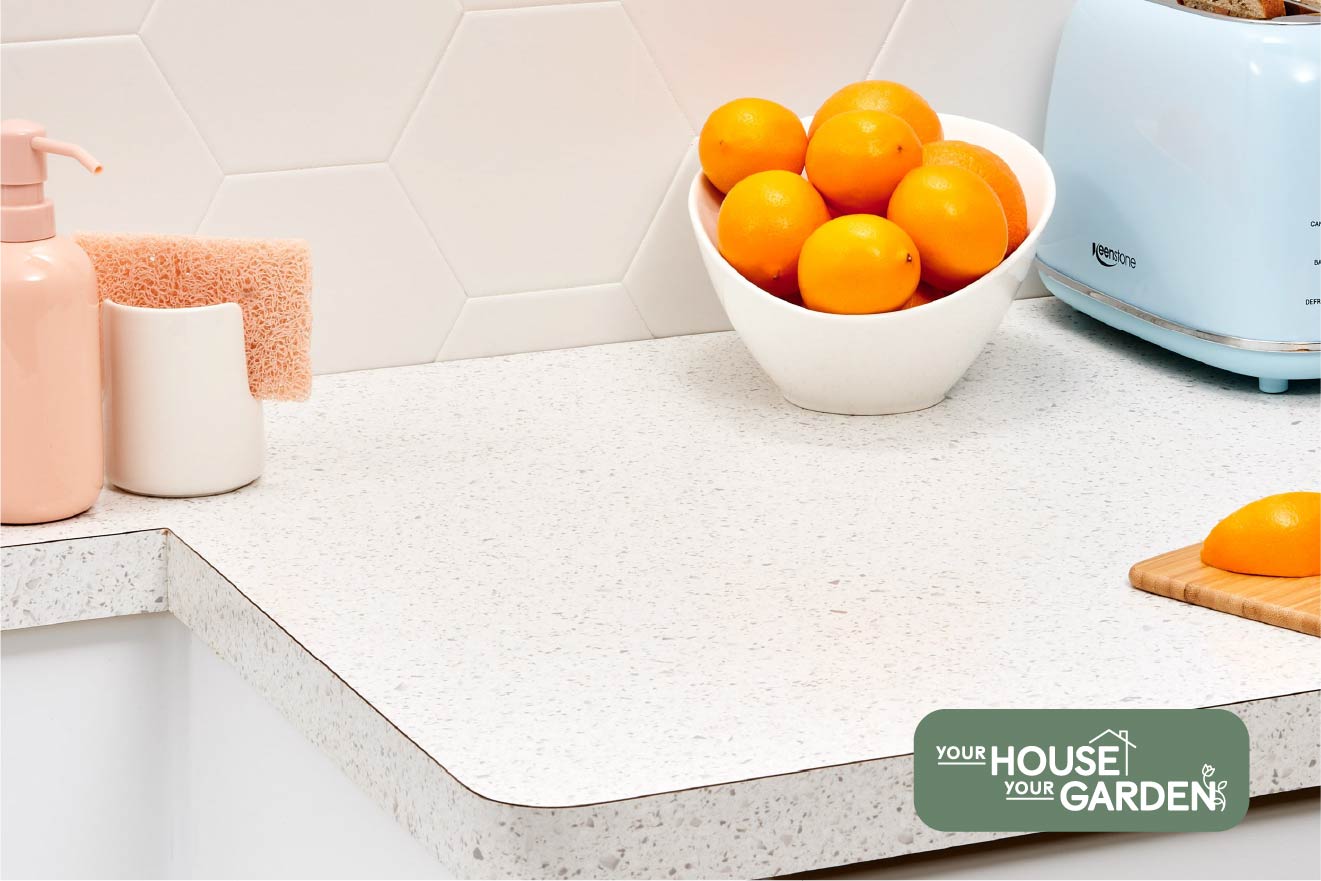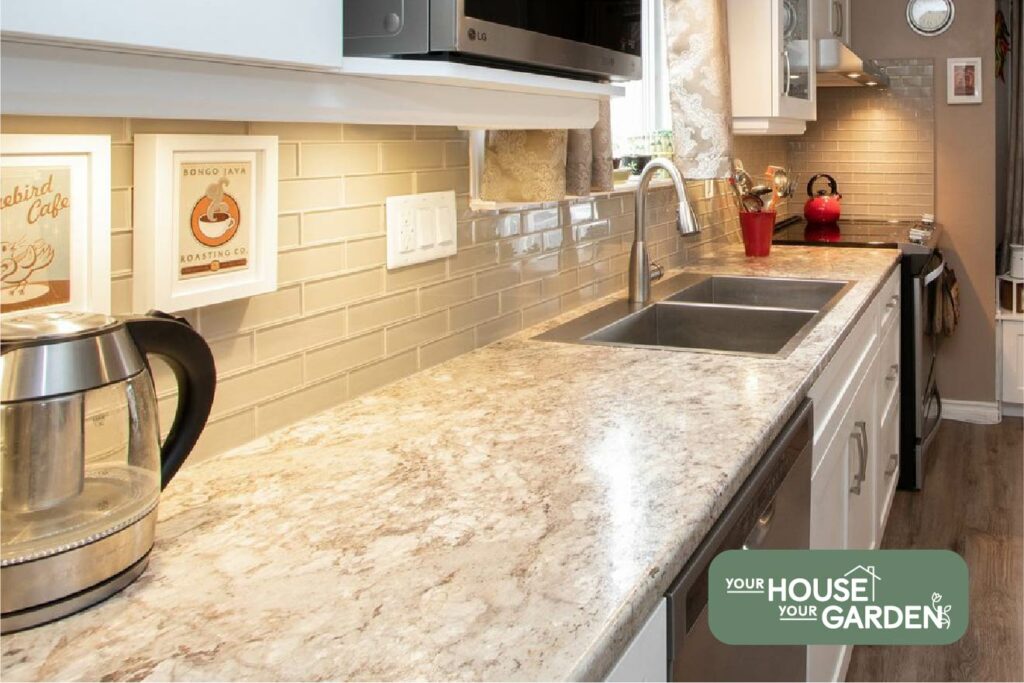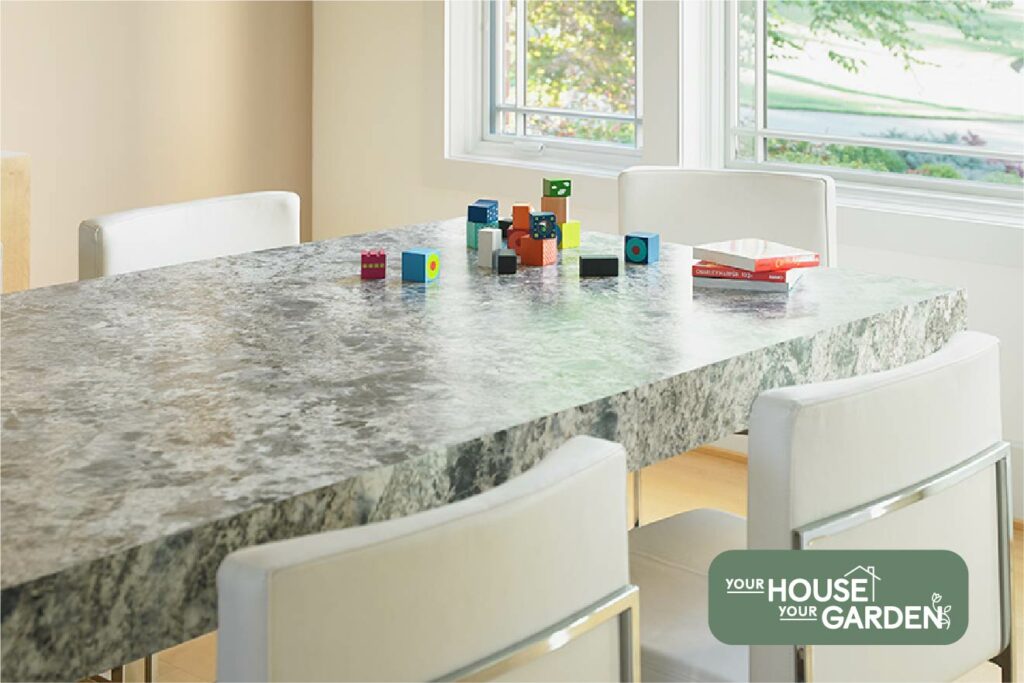Laminate vs Granite Countertops
Home » Home Remodeling » Kitchen Countertops » Laminate vs Granite Countertops
The countertop material that you decide on for your bathrooms and kitchens is a big decision to make because it can make or break the interior design of a space. For those currently looking into laminate and granite counters because one can mimic the other, this guide is for you. Granite has an air of elegance that comes with a steeper price tag while laminate does not put a dent in your wallet but will not last as long. Get to know both options better.
Laminate vs Granite: The Difference
What is Laminate?
Laminate countertops, also known as Formica countertops, boomed in the 1950s and 1960s. Laminate surfaces made out of a combination of wood and paper products held together with resins, such as kraft paper, became popular amongst homeowners that were looking for a more affordable alternative to wood and natural stone countertops. Known as the counter that will save money in the long run, laminate counters have come back as more finishes, patterns, and durable variations are now available on the market. When it comes to durability, laminate may not be associated with this property. However, today there are high-pressure laminates (HPLs) that are decorative surfaces and durable ones too. This type of laminate is more known for being chemical and heat resistant as well as being able to withstand daily wear and tear.
What is Granite?
Granite stone, like marble and quartz stone, is a quarried material from the earth’s surface. This countertop material is an igneous rock formed out of cooled magma and is often composed of quartz, feldspar, and a mix of other minerals depending on where it is quarried from. This countertop option is a quarried stone that has been cut into a slab and polished to become the surface found in kitchens and bathrooms. Like other natural stone materials, granite has a natural charm and beauty that engineered or man-made countertop materials often try to imitate. However, natural stones that become a bathroom or kitchen countertop have the ability to increase a home’s resale value and require more care and maintenance compared to laminate or quartz countertops, for example.

Pros and Cons
Here’s a summary of the advantages and disadvantages of each option:
Laminate Countertops: Pros
More Often Than Not, This Material is the Cheaper Option: Compared to granite, wood, and quartz countertops, a laminate countertop is often the more affordable option per square foot or tile.
Laminated Surfaces are Versatile: A laminate counter comes in a variety of colors, patterns, and finishes, and can mimic other countertop options. Laminates can also be manufactured to seamlessly connect to a sink for cohesion in a space.
Easy to Install Without Professionals: Laminate countertops can be installed by professionals and homeowners alike. The light material simply requires the right tools and a set of instructions followed properly.
Not Tedious to Take Care Of: A laminate countertop is generally easy to take care of. Laminated surfaces do not require regular sealing, can be wiped up to prevent stains, require you to use cutting boards, and are better off if you do not place pans directly on the surface if they are hot.
Laminate Countertops: Cons
Not Known for its Scratch-Resistance: Sharp objects like knives and other utensils can show on laminate. This option will scratch easily and you should take care of the countertop with this in mind.
Prone to Water Damage: Laminate countertops, being made out of layers of paper and wood, will start to delaminate when they are repeatedly exposed to liquids like water.
Not All Laminates Can Take on Heat: Regular laminate is not known for its heat resistance and will be scorched or melted if hot appliances or pots are placed directly on the slabs.
Does Not Last Long After Installation: The typical lifespan of laminate bathroom or kitchen countertops is 10 years to 20 years even with maintenance.
Granite Countertops: Pros
A Maintainable Surface: A granite countertop does not require complicated care. While you do need to be mindful of acidic liquids, many homeowners can easily take care of granite surfaces.
Scratches and Chips Can Be Repaired: Granite countertops are popular because they are easily repairable. This stone surface can be sanded down if it is scratched or chipped and look as good as new.
Durable After Sealing: After you seal a granite countertop, it becomes more scratch-, scorch-, and stain-resistant.
Sustainable Option for Bathroom and Kitchen Countertops: Like other stone materials (e.g., pure quartz and marble), granite is 100% natural. Without any harmful chemicals mixed into these countertops during manufacturing, granite countertops are eco-friendly. Also, their lifespan is at least 30 years with some lasting up to 100 years with proper care and maintenance.
Aesthetic Like Other Natural Stone Countertops: The unique colors found on a granite slab and the various veining patterns are what give these countertops their beauty.
Granite Countertops: Cons
Granite Counters Require Sealing: Unfortunately, in order to maintain granite, this countertop option needs to be sealed regularly. After installation, a sealant should be applied every 1 year to 2 years.
Will Cost More Than Other Materials: Compared to man-made materials like quartz and laminate, granite is the more expensive option for bathroom and kitchen countertops.
Must Be Installed with Proper Support: Granite is the heaviest countertop you can own. This means that proper planning for do-it-yourself (DIY) installation projects is required and this countertop may require more support to stay upright.
Does Not Have Many Variations: Granite, like other naturally occurring materials, is found and quarried in certain areas around the globe. With mineral compositions unique to certain locations, granite does not come in endless colorways and patterns like engineered materials you see at your local big box store.
Granite Countertops Have Uncontrollable Patterns and Color Combinations: Granite may seem like a wildcard for some homeowners. More often than not, a granite slab may have some colors or patterns that you are not looking for. It may also be more difficult to have to adjust your preferences for custom kitchen cabinets or backsplash based on a granite slab instead of the other way around.
Comparing the Two
How do the two countertop materials measure up to each other? Consider the following variables before deciding on one over the other.
Appearance
While manufacturers like Formica have made it possible for laminate countertops to look similar to granite, laminate has a more structured and uniform composition. Granite countertops have unconventional veining patterns and slabs have to be mixed and matched.
Durability
Granite vs laminate, granite is the more durable countertop. While laminate can be manufactured to take on more heat and increase its stain resistance and strength against chemicals, granite still beats laminate surfaces. While granite will need to be sealed to be more protected against stains, this countertop is a very hard surface and can last a lifetime if it is taken care of.
Maintenance
Granite and laminate countertops are better off if you clean up crumbs and spills immediately but comparing the two side-by-side, laminate requires less maintenance. Unlike granite, laminate is manufactured in a way that does not require an additional sealant.
Repairs
Both granite and laminate can be scratched but unlike laminate, granite is easily repairable. Due to the laminate’s composition, it is much better to replace the counter if it is scratched, scorched, or delaminating. Granite does not need to be replaced right away if it is cracked or has visible scratches. This surface can be sanded down. However, if there are chips and more extreme heat damage, granite will cost more to repair.
Price
Laminate vs granite countertops, the former is more budget-friendly. Laminated surfaces cost as little as $20 and as much as $65 per square foot. On the other hand, granite costs $40 up to $100 for a counter of the same size.
Value
As a natural stone, granite has more value and will in turn increase the value of a bathroom or kitchen. Laminate is more affordable and readily available, and the resins, paper, and wood that make up these counters are cheaper as well. That being said, laminate will not increase the value of your home as much as granite would.
Installation
A granite or laminate kitchen countertop can be installed with professional help. However, both options can also be installed by homeowners if the kitchen remodeling or bathroom renovation process is a DIY project.


